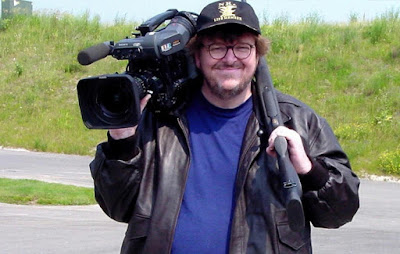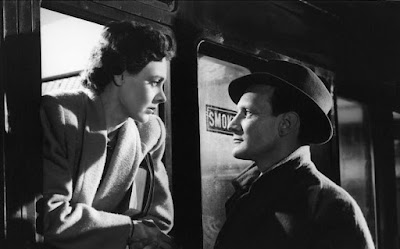Songs from the Second Floor (2000)
Directed by Roy Andersson
* * * *
Songs from the Second Floor is one of those films that I can
confidently say is purely a work of art, and one that defies any kind of
explanation as far as plot is concerned. With that said, you could probably
imagine that there’s not going to be any plot synopsis from me here. That doesn’t
mean this was a bad movie, though. Not at all, because this is not only one of
the greatest surreal absurdist films I’ve seen, but also one of the greatest
dark comedies. Imagine of Bela Tarr collaborated with Luis Bunuel or even
Alejandro Jodrowsky – it would be something like Songs from the Second Floor. Roy Andersson paints a portrait of the
tragic and drab inertia that is modern human existence through a series of
vignettes: traffic is stuck with zero movement. A man is fired from his job,
and he loses his mind over it, less out of financial worry than because it is
all he has known his entire life. Hell, life is so dull and drab that the
characters wander throughout life almost like zombies – they even mingle with
the literal dead at one point. They make good company together.
Though this is a deeply
profound film, it also works on a remarkably subtle level. Each scene is shot
in one take, and the camera doesn’t move at all, letting the viewer is
subjected to every single inch of the absurdity. Seemingly everybody in this
film wears this grayish bland makeup, and works brilliantly on two levels: a
metaphor for the artificial “face” we put on everyday, and how that “face”
makes us dead in a way. The color palette is also flawlessly maintained throughout
– as you could imagine, lots of gray tones. So much so that even the colors
that do make an appearance seem to be overcast by the grayness – kind of
reminds me of that Lewis Black joke about the grayness of February. In fact,
that whole joke perfectly describes this movie. Some might roll their eyes at
the idea of yet another piece of art that is pessimistically concerned with the
alleged pointlessness of life. Part of me wanted to, at first, but I was
quickly taken by what a great film this was. Truly a surrealist masterpiece
that I won’t be forgetting anytime soon.
Step Brothers (2008)
Directed by Adam McKay
* * ½
Nancy and Robert (Mary
Steenburg and Richard Jenkins, respectively) find instant attraction to each
other, one of the biggest points of appeal being their mutual care of their
grown adult sons, Brennan (Will Ferrell) and Dale (John C. Reilly), both of
whom still live with them. When Nancy and Robert decide to get married, the two
step brothers and their spoiled sense of entitlement throw one hell of a monkey
wrench into this new way of life. However, in between all of their childish
antics, things begin to brighten when they find something to bond over: their
mutual hate for Derek (Adam Scott), Brennan’s snooty and more successful
brother.
As fun as the Will Ferrell era
of comedy from the mid-to-late 2000s was, it ran its course pretty quickly for
me. It wasn’t a bad time, I suppose. I guess I just got kind of tired of that
style of comedy. On one hand, I wasn’t expecting much with Step Brothers – I certainly wasn’t expecting anything bad (nor was
it). On the other hand, though I’ve been begged by acquaintances for years to
watch Step Brothers, so I set my
expectations a little higher than I should have. I enjoyed it, somewhat, but it
wasn’t as funny as I was hoping it was going to be. It’s really hard to
describe, because it’s not doing anything wrong, it just never really hits many
strides, and didn’t leave much impression. I mean, it was made and acted just
fine. It just didn’t have much lasting power for me.
I must admit, though, that
there were some lines in Step Brothers that
were absolutely hysterical – my favorite being “It’s like masturbating in a
time machine” while Reilly and Ferrell flip through vintage porn magazines. And
I don’t want to make Step Brothers sound
like a waste of time, because it wasn’t: it was quite amusing, actually. I wish
I had more to say, but there’s really not much else for a mini-review. It was a
fun way to spend a little less than two hours, but just doesn’t have much to
offer beyond that.
Wonderland (1999)
Directed by Michael Winterbottom
* *
Yet another weekend approaches
London for a trio of sisters, their elderly parents, and the latter’s
neighbors, all of whom are lonely in their own individual ways. First, there’s
the sisters: Nadia (Gina McKee), a waitress in a small café, spends her days
posting personal ads and going on dates; Molly (Molly Parker) is pregnant and
expected to deliver any day, but her husband (John Simm) is unprepared for the
responsibility of fatherhood; and the promiscuous Debbie (Shirley Henderson), a
single mother who lets her son spend the weekend with his hot-tempered father
(Ian Hart). Their parents are Eilenn (Kika Markham) and Bill (Jack Shepherd),
whose marriage has deteriorated to a cold and drab state. We watch as the
weekend unfolds for these people, and how they deal with their loneliness in
their own ways.
I wanted to really love this
movie. Not only do I love hyperlink films, but the subject of loneliness is one
of my favorite themes in the movies, but Wonderland
just didn’t cut it for me. All of these characters have glimmers of
interesting quality – Nadia especially – but there’s no depth to any of them in
the slightest. Granted, I don’t like when movies overload the viewer with
exposition, but Wonderland doesn’t
even insinuate how these characters have gotten to where they are – there’s
nothing to think about afterward. Also, the movie is not well paced – there’s no rhyme or reason when it switches focus
from character to character, to the point where you might forget that a
character or two even exist.
All this said, Wonderland is a film that exists less to
tell a story than to observe behavior, and I admire it for that. There’s a
documentary quality to the film that goes over quite well. The visual style,
though very late ‘90s/early ‘00s, is
quite fascinating. Michael Nyman’s score also shines throughout, and speaking
of music; Massive Attack’s “Angel” makes an appearance, and anytime I hear a MA
song in a film, I give immediate props. But none of this really culminates into
a rewarding film experience. It’s not a bad film, but it’s very dry, which is
strange, considering it doesn’t look dry at all.
Wrong Move (1975)
Directed by Wim Wenders
* * ½
Aimless and somewhat jaded of
the world around him, aspiring writer Wilhelm (Rudiger Vogler), a man of very
few words, leaves his mother, girlfriend, and hometown, catching the train
bound for Bonn, in search of…maybe he doesn’t even know. Along the way, though,
he finds his journey joined by a handful of colorful compatriots – Laertes
(Hans Christien Blech), an elderly man with a secret past and a knack for the
harmonica; Mignon (Nastassja Schygulla), a mute and alluring street performer;
Bernhard (Peter Kern), a clumsy and awkward poet; finally there is Therese
(Hanna Schygulla), a gorgeous actress who seems to fancy Wilhelm. Through this
journey with such a wonderfully odd party, maybe Wilhelm will find something in this drab life of his.
It seems that most of the time the centerpiece film is
always the weakest with film trilogies. Here we are with Wrong Move, the second entry into Wim Wenders’s “Road Trilogy” (as
well as a modern-day adaptation of the 18th Century novel Wilhelm Meister’s Apprenticeship), and
it’s unfortunately not an exception to the rule. It’s actually kind of
frustrating – the characters are all interesting and kind of fun, and the film
tries to take advantage of that, but the writing is almost unbearably dry. I
remember the characters and their personalities, but I don’t remember a single
conversation or line of dialogue. At least the film wasn’t unbearably long or
even felt long for that matter.
On a technical level, however,
Wrong Move does surpass the touching
and otherwise superior Alice in the
Cities (see last week’s Weekly Recap for details on that). This film takes
a bit more visual advantage of the whole road concept, and there are some
stunning visuals here – much of the final act takes place on a bendy road on a
large hill, and it is absolutely gorgeous. All of the actors fit their
characters perfectly – Vogler’s terrific abilities as an actor go without saying,
and I was particularly struck by the enigma of Schygulla’s portrayal of the
mute juggler. Perhaps I just wasn’t feeling this one, because I felt like there
was something really interesting going on here, but the dryness just kept it
pinned down. Maybe another watch will unveil something spectacular in the
future. We’ll see.





















